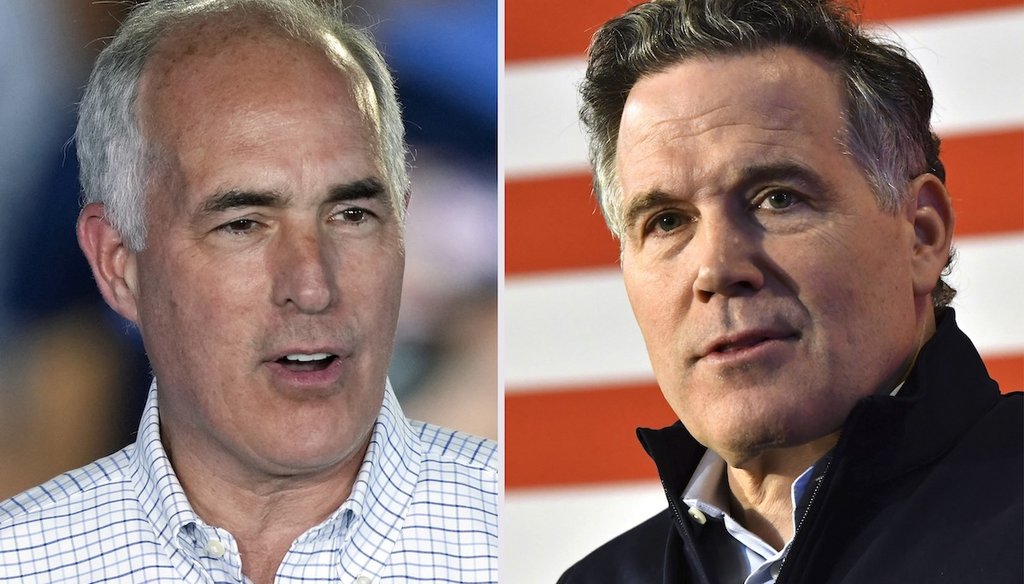Stand up for the facts!
Our only agenda is to publish the truth so you can be an informed participant in democracy.
We need your help.
I would like to contribute

This combination of photos taken in Pennsylvania shows Sen. Bob Casey, D-Pa., left, and David McCormick, the Republican nominee for Senate in Pennsylvania. (AP)
During their first debate, Sen. Bob Casey, D-Pa., and his Republican Senate challenger, Dave McCormick, traded jabs over prices, immigration, energy policy and personal investments.
In the Oct. 3 faceoff, Casey frequently attacked McCormick for investments he made while he led the hedge fund Bridgewater Associates, and accused McCormick of not living in the state. McCormick tied Casey to Democratic presidential nominee Vice President Kamala Harris and accused him of accomplishing little and being out of step with Pennsylvania voters.
The debate, hosted by Nexstar Media Group and broadcast across the state, was the first of two planned meetings for the candidates. They will debate again Oct. 15.
Abortion
Casey: "When the decision was made to overturn Roe, his reaction was that that decision made him ‘very, very happy.’"
This is largely accurate, but ignores that McCormick has softened his position on abortion since the last time he ran for Senate. In 2022, when McCormick ran in the Republican primary, he said he was "staunchly pro-life and believes life begins at conception." Now, McCormick says he would vote no on a national abortion ban, and he said he supports Pennsylvania’s law that allows abortion until 24 weeks unless the pregnant woman’s life is at risk.
In a May 2022 Republican primary Senate debate when asked about the leaked draft ruling by the U.S. Supreme Court to overturn Roe v. Wade, McCormick said it would be a "huge victory for the protection of innocent life," and he would be "very, very happy about it" if it were made official.
Now and then, McCormick said he believes abortion laws should be left to the individual states.
McCormick: Casey supported legislation that "would allow abortions up until the due date."
We rated a similar claim made in a Montana Senate race False. Casey voted for the Women’s Health Protection Act in 2022, a bill that would codify the abortion rights that were guaranteed under Roe v. Wade.
The law would protect abortion rights until fetal viability, which is around 24 weeks. After that, abortion would only be allowed if a medical professional judges that there is a risk to the pregnant woman’s health.
McCormick: "Sen. Casey said he wanted to overturn Roe v. Wade. Sen. Casey was only for one exception, which is life of the mother."
This is mostly on track, but it’s not Casey’s current position. Casey spent most of his career as a "pro-life Democrat," and he has supported certain abortion restrictions in the past. As recently as 2020, Casey backed a bill to ban abortions nationally after 20 weeks with some exceptions. He was one of two Democrats to support the bill, along with Sen. Joe Manchin of West Virginia, who is now an independent.
A 2018 Politico article described Casey as opposed to the Roe decision.
In a 2002 radio interview, when he was running for governor of Pennsylvania, Casey said he favored "the one exception for the life of the mother." He said, though, that he expected any bill the Pennsylvania Legislature passed would include exceptions for rape and incest, and he would have signed such a bill into law.
However, since the U.S. Supreme Court in June 2022 overturned Roe v. Wade, the 1973 ruling that held abortion access was a federally protected right, Casey has said he supports broad rights to abortion and voted for Democratic-backed legislation to codify the protections in place under Roe v. Wade.
Fracking
McCormick: "This is a senator who now says he wouldn't ban fracking, and Kamala Harris says they wouldn't ban fracking, so they now have synchronized flip-flopping."
This is misleading. Bob Casey has never called for a ban on hydraulic fracturing, aka fracking, so McCormick is wrong to say he’s flip-flopped on the issue. Casey said he opposed a fracking ban in 2020 after Rep. Alexandria Ocasio-Cortez, D-N.Y., and Sen. Bernie Sanders, I-Vt., introduced legislation to ban the practice.
Harris supported banning fracking in 2019 as a U.S. senator when she ran in the 2019 Democratic presidential primary. She said she would take action to ban the practice on federal lands, and would support congressional action for a broader ban. But Harris has said repeatedly, in the presidential debate and in interviews, that she no longer favors banning fracking.
Casey: "I voted against a fracking ban."
Not quite. Casey has opposed attempts in Congress to ban fracking, but he’s never voted against a fracking ban, because a fracking ban has never come up for a vote in the Senate.
He may be referring to his 2021 vote for an amendment to prohibit the Council on Environmental Quality and the Environmental Protection Agency from creating rules that ban fracking. Casey was one of seven Democrats that joined Republicans in that vote.
He also came out in opposition to the Fracking Ban Act when Sanders introduced it in the Senate in 2020, but that bill never came to a vote.
Prices
McCormick: "The cause of inflation is the policies, the out-of-control spending of Biden, Harris and Casey."
This is missing context. We’ve spoken to economists about claims like this throughout this election cycle. The $1.9 trillion American Rescue Plan Act of 2021 contributed to inflation, but it was not the primary or sole cause.
Economists widely agree the law put too much money in Americans’ pockets while global supply chains were strained because of the pandemic. This meant demand outstripped supply, leading prices to spike.
Although the law may have exacerbated inflation, most economists agree that other factors worsened inflation, including the pandemic-related supply chain shortage and the oil price spike and trade interruptions caused by Russia’s invasion of Ukraine.
Douglas Holtz-Eakin, president of the center-right American Action Forum, and Dean Baker, a senior economist at the liberal Center for Economic and Policy Research, both estimated the American Rescue Plan was responsible for around 2 percentage points of the inflation increase in 2021 and 2022.
Casey: "These big corporations rigged those prices and jacked them up to levels we've never seen, all while they were getting record profits."
We rated a similar claim Mostly False.
We rated a similar claim Mostly False.
Corporate profits did rise significantly after the pandemic, and they rose faster than prices.
Some economic studies and think tanks have argued that corporations have hiked prices more than the underlying input costs. But economists told us that supply chain shortages, labor costs, real estate prices and higher demand were the primary reasons for higher costs, not arbitrary price hikes by corporations. So although prices did rise, they weren’t "rigged"; there were economic forces behind the price hikes.
UPDATE, Oct. 4, 2024: This story has been updated to more accurately reflect that PolitiFact previously rated Casey on a similar claim about corporate prices.
Our Sources
Sources linked in the article.




































